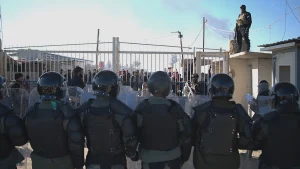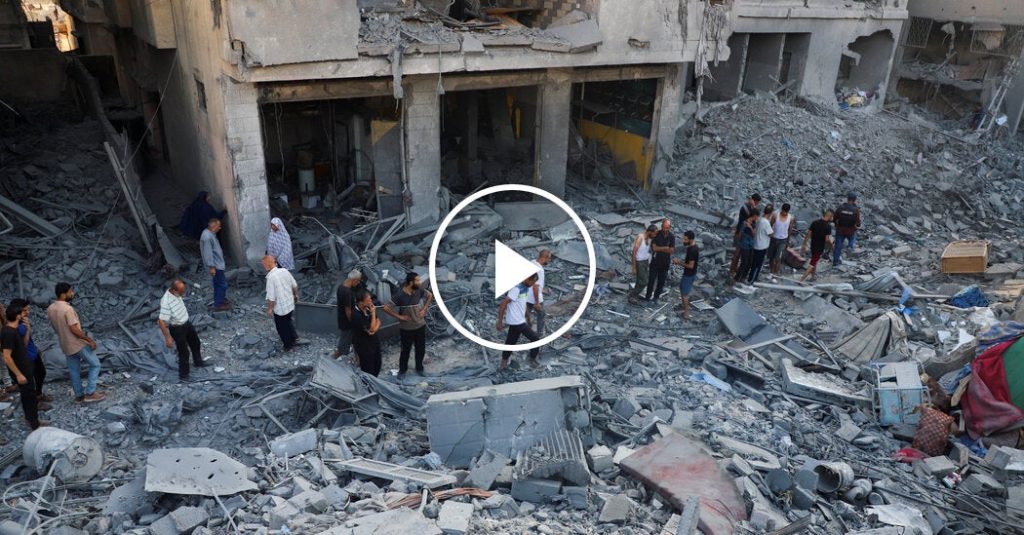Israel Intensifies Military Campaign with Ground Operation in Gaza City
Israeli Forces Launch Ground Incursion Amid Escalating Violence in the Region
The Israeli military announced Tuesday it has initiated a ground operation into Gaza City, marking a significant escalation in the ongoing conflict that has devastated the region. This development comes alongside intensified aerial bombardment of Gaza City, which local health officials report has resulted in at least 20 fatalities and dozens of injuries since midnight. The operation represents a critical turning point in the conflict, raising concerns about civilian casualties and humanitarian conditions in an already crisis-stricken area.
The military incursion follows weeks of airstrikes and growing international pressure for restraint from both sides. “We have begun a targeted ground operation in specific areas of Gaza City,” an Israeli Defense Forces spokesperson confirmed in a statement, describing the mission as focused on “terrorist infrastructure.” Military analysts suggest this operation may indicate a shift from aerial campaigns to more direct engagement, potentially signaling a new phase in Israel’s military strategy. The IDF has maintained that its operations target militant groups, particularly Hamas, which it holds responsible for attacks against Israeli civilians.
Humanitarian Crisis Deepens as Bombardment Intensifies
The intensification of military operations has exacerbated an already dire humanitarian situation in Gaza. Aid organizations report critical shortages of essential supplies including food, water, medicine, and fuel. International relief agencies, including the United Nations Relief and Works Agency (UNRWA), have warned that Gaza’s healthcare system is on the verge of collapse, with hospitals operating beyond capacity and with severely limited resources. “We’re witnessing an unprecedented humanitarian emergency,” explained a senior humanitarian coordinator working in the region. “Medical facilities are overwhelmed with casualties while simultaneously running out of basic supplies to treat them.”
Civilian infrastructure has sustained significant damage during the bombardment, with residential buildings, schools, and healthcare facilities affected by airstrikes. Displaced residents describe increasingly desperate conditions, with many families forced to relocate multiple times as formerly safe areas become targets. “There is nowhere left to go,” said one Gaza resident who requested anonymity for safety concerns. “We move from one place to another, but the bombs follow us.” The United Nations estimates that tens of thousands of Palestinians have been displaced within Gaza, creating additional humanitarian challenges in the densely populated territory where safe shelter options are extremely limited.
International Response and Diplomatic Tensions
The ground operation has elicited strong reactions from the international community, revealing deep divisions in how various nations view the conflict. While some of Israel’s allies have affirmed its right to self-defense, many countries and international organizations have called for an immediate ceasefire and expressed alarm at the mounting civilian casualties. The United Nations Security Council has convened emergency sessions to address the escalation, though consensus on a resolution has proven elusive due to fundamental disagreements among permanent members.
Human rights organizations have raised serious concerns about potential violations of international humanitarian law by both sides in the conflict. “All parties must respect the principles of distinction, proportionality, and precaution under international humanitarian law,” stated a spokesperson for Human Rights Watch. “Civilians must be protected regardless of the military objectives.” The International Committee of the Red Cross has called for immediate humanitarian access to Gaza, emphasizing that all wounded and sick people have the right to medical care under international law. Meanwhile, diplomatic efforts to broker a ceasefire continue, with several nations offering to mediate talks between the parties.
Contrasting Narratives and Accusations
The conflict has generated sharply contrasting narratives that reflect the deep-seated tensions in the region. During a recent international forum, a human rights commissioner described the situation in Gaza as “a moral outrage and a legal emergency,” urging member states to take immediate action. This characterization was promptly rejected by Israeli representatives, who described such statements as “libelous” and promoting what they termed a “malicious genocide narrative.” These competing perspectives illustrate the profound difficulties facing any potential resolution process.
The rhetoric surrounding the conflict has intensified alongside the military operations. Israeli officials maintain that their actions are necessary to neutralize security threats posed by militant groups operating in Gaza, particularly following attacks against Israeli civilians. Palestinian representatives and supporters counter that the scale and nature of Israel’s military response constitutes collective punishment of a civilian population. These fundamentally opposed viewpoints extend beyond the immediate parties to the conflict, with different nations, international organizations, and advocacy groups aligning with contrasting interpretations of events and responsibilities.
Historical Context and Prospects for Resolution
The current escalation takes place against a backdrop of decades of conflict, failed peace initiatives, and entrenched grievances. Military analysts note that ground operations in Gaza have historically proven complex and costly for Israel, with urban environments presenting significant tactical challenges and risks of prolonged engagement. Previous incursions have resulted in substantial casualties on both sides and have generally failed to produce lasting security arrangements or political solutions. This historical pattern raises questions about the strategic objectives and potential outcomes of the current operation.
The path toward de-escalation remains unclear as military operations intensify. Diplomatic initiatives continue in various international forums, though previous ceasefire attempts have quickly collapsed. Humanitarian organizations emphasize that regardless of political and military developments, immediate steps must be taken to protect civilians and ensure the delivery of essential aid. “Beyond the immediate crisis, what’s needed is a fundamental reconsideration of the approach to this conflict,” explained a veteran Middle East diplomat speaking on condition of anonymity. “Military solutions have repeatedly failed to address the underlying issues driving this cycle of violence.” As the ground operation unfolds, attention will focus not only on the immediate humanitarian impact but also on whether this escalation might eventually create conditions for meaningful dialogue or simply deepen the entrenched positions that have characterized this enduring conflict.








